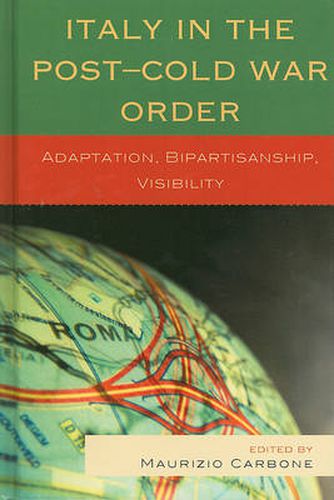Readings Newsletter
Become a Readings Member to make your shopping experience even easier.
Sign in or sign up for free!
You’re not far away from qualifying for FREE standard shipping within Australia
You’ve qualified for FREE standard shipping within Australia
The cart is loading…






There are little doubts that Italy has attempted to play a more assertive role in the international arena since the end of the Cold War. During the first forty years of its Republican history, conditioned by both the polarized international context and an antagonistic domestic political system, Italy delegated its main choices in international affairs to external actors, most notably NATO and the European Union. The transition from a bipolar to a unipolar/multipolar world order provided Italy with new opportunities to pursue its political and commercial interests more autonomously, as well as new responsibilities, to actively contribute to solving conflicts and addressing new global threats. At the same time, the collapse of the traditional parties (linked to the fall of the Berlin wall and the Clean Hands enquiries) and the changes of the electoral law (from a proportional representation into a quasi-majoritarian system) generated two heterogeneous coalitions which have regularly alternated in power, but do not always share the same views and approaches-with differences at times of form, and more often of substance.
Against this background, Italy in the Post-Cold War Order: Adaptation, Bipartisanship, Visibility, edited by Maurizio Carbone, seeks to explain the evolution of Italy’s international action over a twenty-year span (1989-2009). Three central questions are addressed. First, how does Italy adapt to transformations of the international system? Second, how does its ever-changing political system influence Italy’s choices in foreign relations? Third, how do domestic structures constrain (or enable) Italy’s place on the world stage? To answer these questions, this book consists of two broad parts. The first part sets the context and discusses issues ‘horizontally,’ focusing on foreign policy, security and defense policy, development cooperation, and multilateral action. The second part, which takes a ‘vertical’ approach, discusses Italy’s relations with key countries and regions of the world
$9.00 standard shipping within Australia
FREE standard shipping within Australia for orders over $100.00
Express & International shipping calculated at checkout
There are little doubts that Italy has attempted to play a more assertive role in the international arena since the end of the Cold War. During the first forty years of its Republican history, conditioned by both the polarized international context and an antagonistic domestic political system, Italy delegated its main choices in international affairs to external actors, most notably NATO and the European Union. The transition from a bipolar to a unipolar/multipolar world order provided Italy with new opportunities to pursue its political and commercial interests more autonomously, as well as new responsibilities, to actively contribute to solving conflicts and addressing new global threats. At the same time, the collapse of the traditional parties (linked to the fall of the Berlin wall and the Clean Hands enquiries) and the changes of the electoral law (from a proportional representation into a quasi-majoritarian system) generated two heterogeneous coalitions which have regularly alternated in power, but do not always share the same views and approaches-with differences at times of form, and more often of substance.
Against this background, Italy in the Post-Cold War Order: Adaptation, Bipartisanship, Visibility, edited by Maurizio Carbone, seeks to explain the evolution of Italy’s international action over a twenty-year span (1989-2009). Three central questions are addressed. First, how does Italy adapt to transformations of the international system? Second, how does its ever-changing political system influence Italy’s choices in foreign relations? Third, how do domestic structures constrain (or enable) Italy’s place on the world stage? To answer these questions, this book consists of two broad parts. The first part sets the context and discusses issues ‘horizontally,’ focusing on foreign policy, security and defense policy, development cooperation, and multilateral action. The second part, which takes a ‘vertical’ approach, discusses Italy’s relations with key countries and regions of the world